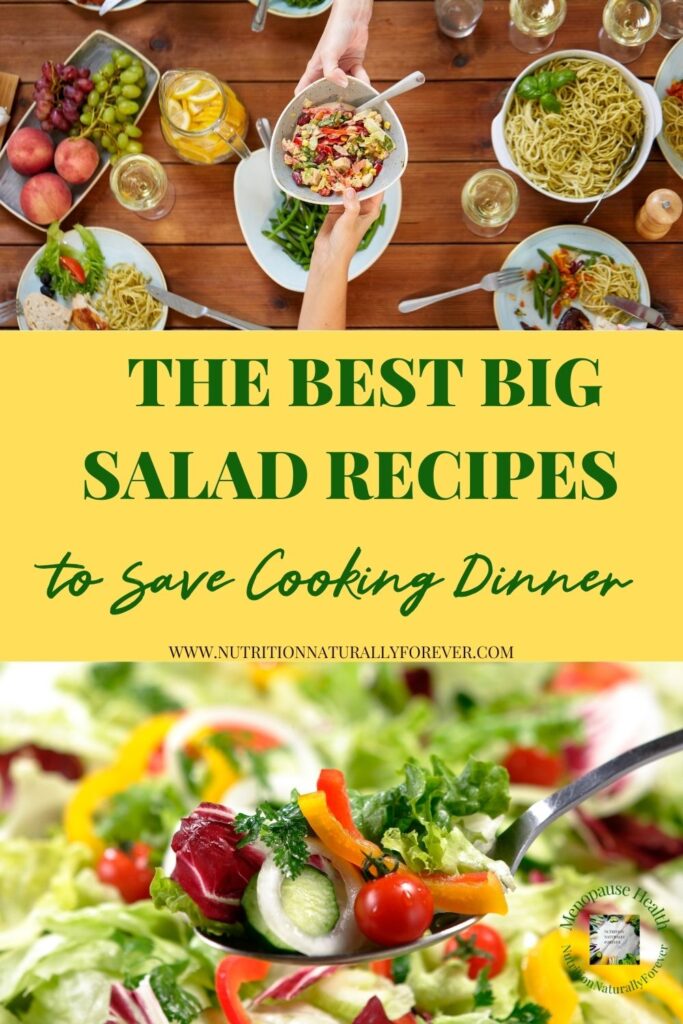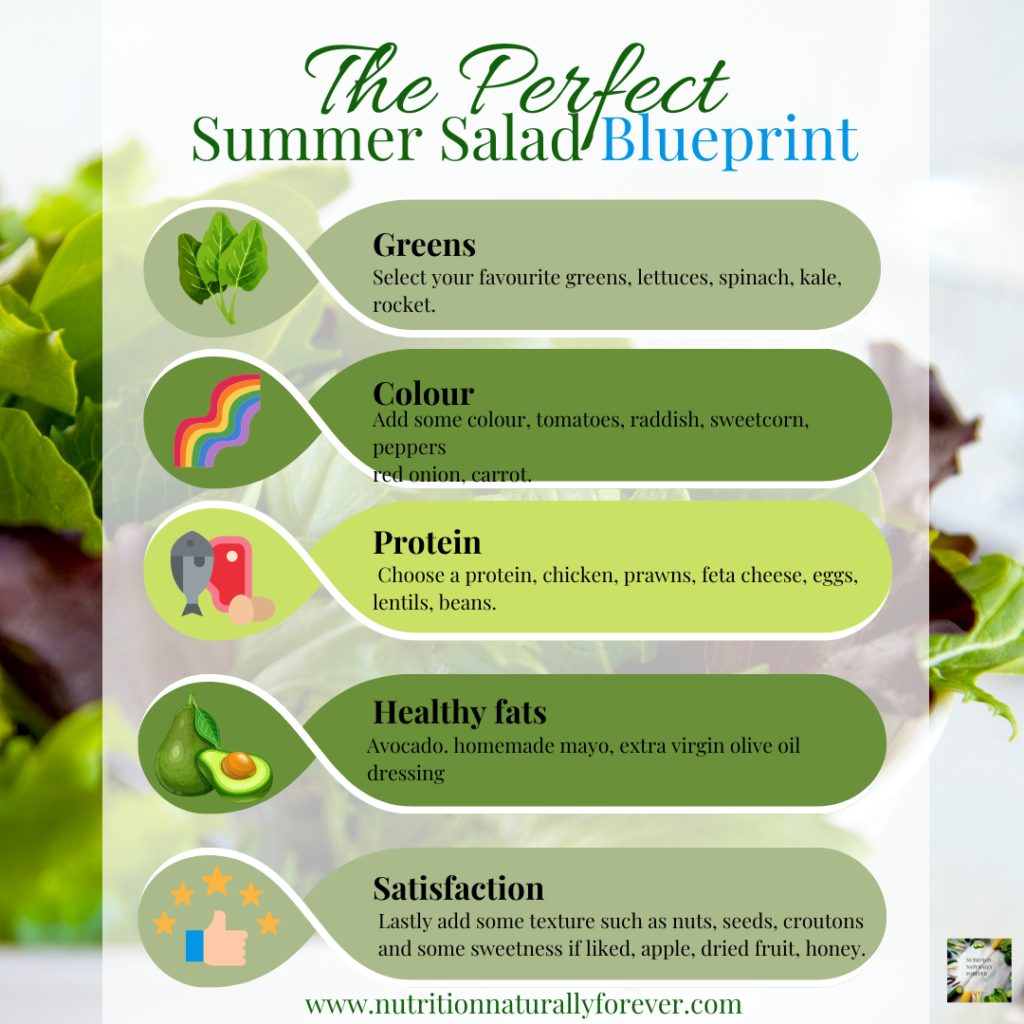
The Best Big Salad Recipes to Save Cooking Dinner.
Salads don’t have to be boring, they can be a complete main dish with a little forethought.
Depending on the ingredients you choose you can make once and have multiple meals.
I used to love going to The Harvester just for the salad that was pre-prepared, I could just choose whichever components I fancied and top with a delicious dressing.
You could recreate this in your fridge, using different pots (preferably glass) for different components allowing you to design a nutritious meal with the click of a few lids.
The key to making a nutritious well-balanced salad is to follow a basic formula which I am going to share with you in this post.
A Good Green Base
Good salads always start with a base of leafy greens.
Leafy greens like baby spinach, romaine lettuce, kale, collard greens, and Swiss chard are packed with essential vitamins and minerals that are particularly important during menopause:
- Calcium and Vitamin K: Crucial for bone health, which is a major concern during menopause due to the increased risk of osteoporosis.
- Magnesium: Helps in maintaining muscle and nerve function, regulating blood pressure, and supporting the immune system.
- Folate: Important for cell function and tissue growth.
They are also packed with antioxidants such as vitamins A, C, and E. These antioxidants help combat oxidative stress, which can increase during menopause and contribute to symptoms like hot flashes and mood swings.
Some leafy greens contain phytoestrogens, plant-based compounds that mimic estrogen in the body. These can help create hormone harmony and alleviate menopausal symptoms like hot flashes and night sweats.
Don’t forget about fresh herbs. These small but mighty greens add flavour and pack a nutritional punch.
Eat The Rainbow
Choose as many raw veggies as you like however the greater the variety of colours the more nutrients you will be consuming;
Red
Tomatoes, red bell pepper, radishes, beets, red cabbage, red onion
- Nutrients: Lycopene, vitamin C, potassium, folate
- Benefits: Lycopene is a powerful antioxidant linked to reduced risk of certain cancers (especially prostate cancer) and heart disease. Red vegetables are also good for skin health and boosting the immune system.
Orange and Yellow
Carrots, sweet potatoes, butternut squash, yellow bell peppers, pumpkin
- Nutrients: Beta-carotene, vitamin C, potassium
- Benefits: Beta-carotene is converted to vitamin A in the body, essential for vision, immune function, and skin health. These vegetables also support heart health and reduce the risk of certain cancers.
Green
Spinach, kale, broccoli, Brussels sprouts, green beans, cucumbers
- Nutrients: Chlorophyll, fibre, vitamins A, C, E, and K, folate, iron, calcium
- Benefits: Green vegetables support detoxification, improve digestion, and are crucial for bone health. They also provide antioxidants that reduce inflammation and lower the risk of chronic diseases.
Blue and Purple
Eggplant/Aubergine, purple cabbage, blueberries, blackberries
- Nutrients: Anthocyanins, vitamin C, fibre
- Benefits: Anthocyanins are antioxidants that have anti-inflammatory and anti-cancer properties. They support brain health, improve memory, and may reduce the risk of heart disease.
White and Brown
Cauliflower, garlic, onions, mushrooms, potatoes
- Nutrients: Allicin, potassium, fibre, vitamin C
- Benefits: White vegetables often contain compounds like allicin, which has antimicrobial and anti-inflammatory properties. These vegetables support immune function, improve cardiovascular health, and provide essential nutrients for overall well-being.
Dig deep in your crisper drawer and make use of all the produce you bought with good intentions.
Animal & Plant-Based Proteins
Protein is so important for menopause health and most women don’t eat enough (find out how much protein you need with my free cheat sheet).
It is essential for numerous vital functions in the body, including building and repairing tissues, producing enzymes and hormones, supporting immune function, and maintaining fluid and pH balance.
Proteins such as collagen and keratin provide structural support to skin, hair, and nails, while enzymes catalyze biochemical reactions necessary for metabolism and digestion.
Hormonal proteins like insulin regulate blood sugar, and antibodies help defend against infections.
Additionally, proteins transport and store nutrients, maintain muscle health and can serve as an energy source when needed.
Overall, adequate protein intake is crucial for menopause health and well-being.
Plant-based sources of protein include;
- Legumes:
- Chickpeas: Roasted or plain, they add a nutty flavour and a crunchy texture.
- Lentils: Cooked lentils mix well with greens and other vegetables.
- Black Beans: Great for adding a creamy texture and rich flavour, especially in Southwest or Mexican-style salads.
- Tofu and Tempeh:
- Tofu: Can be grilled, baked, or stir-fried for added texture and flavour.
- Tempeh: Marinated and cooked tempeh add a nutty, earthy taste.
- Edamame:
- Shelled edamame beans are a quick and easy addition, providing a good amount of protein and fibre.
- Quinoa:
- This pseudo-grain is a complete protein and adds a light, fluffy texture to salads.
- Nuts and Seeds:
- Almonds, walnuts, sunflower seeds, pumpkin seeds: These add a crunchy texture and healthy fats, along with protein.
- Plant-Based Cheese:
- Varieties made from nuts or soy can add creaminess and flavour.
Animal-Based Proteins
- Poultry:
- Chicken Breast: Grilled, baked, or shredded, it’s a lean and versatile option.
- Turkey: Similar to chicken, turkey can be roasted or grilled and added to salads.
- Seafood:
- Salmon: Grilled, baked, or smoked salmon provides healthy fats along with protein.
- Tuna: Fresh or canned tuna works well in a variety of salad styles.
- Shrimp/Prawn: Grilled or boiled shrimp/prawn add a sweet and tender protein option.
- Eggs:
- Hard-Boiled Eggs: Sliced or chopped, they add a creamy texture and rich flavour.
- Poached or Fried Eggs: Can be used to top a salad for added richness.
- Dairy:
- Cheese: Feta, goat cheese, mozzarella, or Parmesan add a flavourful and creamy protein source.
- Cottage Cheese: Provides a mild flavour and creamy texture.
- Lean Meats:
- Beef: Grilled steak slices can add a hearty protein boost.
- Pork: Grilled or roasted pork tenderloin slices can add a savoury element to salads.
Don’t Forget the Fat
Fat plays a crucial role in a well-balanced salad for menopausal women for several reasons:
1. Hormone Regulation – Healthy fats are vital for hormone production and balance and help to regulate and stabilise hormonal fluctuations that are common during menopause.
2. Absorption of Fat-Soluble Vitamins – Vitamins A, D, E, and K are essential fat-soluble vitamins, meaning they require dietary fat for proper absorption. Including fats in salads ensures menopausal women can absorb these vitamins efficiently, which are crucial for bone health, immune function, and skin health.
3. Inflammation Reduction – Omega-3 Fatty Acids found in flaxseeds, chia seeds, walnuts, and fatty fish, have anti-inflammatory properties that can help reduce menopausal symptoms such as joint pain and hot flashes.
6. Satiety and Weight Management – Fats contribute to a feeling of fullness and satisfaction after meals, which can help manage weight by reducing the likelihood of overeating. This is particularly important to protect metabolic health.
7. Skin Health – Fats help maintain skin elasticity and hydration, combating the dryness and loss of elasticity that can accompany menopause.
8. Brain Health – Omega-3 fatty acids support brain health and cognitive function, which can help mitigate mood swings, anxiety, and depression that some women experience during menopause.
Examples of Healthy Fats for Salads
- Avocado: Adds creaminess and is rich in monounsaturated fats.
- Olive Oil: A great source of monounsaturated fats and antioxidants.
- Nuts and Seeds: Walnuts, almonds, flaxseeds, and chia seeds provide omega-3 fatty acids and add a crunchy texture.
- Fatty Fish: Salmon or mackerel, for those who include animal products, are excellent sources of omega-3s.
- Olives: Provide monounsaturated fats and a burst of flavour.
- Coconut: Shredded or in oil form, it adds a tropical flavour and healthy saturated fats.
Incorporating these healthy fats into salads not only enhances the taste and texture but also supports the overall health and well-being of menopausal women by addressing specific nutritional needs and helping to manage menopausal symptoms effectively.

Inspiration & Satisfaction
Use your creativity to mix things up and it’s like you are eating a different meal each time you have a salad.
Don’t forget to add some texture with extra crunch such as pine nuts, sunflower seeds, or croutons.
If you are buying croutons in a packet, check that the ingredients don’t list pro-inflammatory ingredients such as seed oils.
You can always make croutons by pan-frying some sourdough bread in some olive oil to toast it and soak up the flavour and nutritional fat.
Here are some Big Salad Recipe ideas to get you started;
- Mediterranean Salad: Quinoa, chickpeas, cherry tomatoes, cucumbers, olives, feta cheese.
- Mexican Salad: Grilled chicken, black beans, sweetcorn, avocado, tomatoes, red onion, cilantro/coriander, lime-cumin dressing.
- Asian Tofu Salad: Marinated tofu, mixed greens, shredded carrots, bell peppers, snap peas, sesame-ginger dressing.
- Seafood Salad: Mixed greens, grilled shrimp/prawn, avocado, cherry tomatoes, cucumbers, lemon vinaigrette.
- Greek Salad with a Protein Punch: Mixed greens, chickpeas, cucumbers, cherry tomatoes, red onion, Kalamata olives, feta cheese, Greek dressing.
- Spinach and Strawberry Salad: Spinach, grilled chicken, strawberries, almonds, goat cheese, and balsamic vinaigrette.
I hope this post inspires you to create big salad recipes that you can make once and eat multiple times to save you time while also taking care of your optimal health.
Get Some Support
Every menopause experience is unique.
Discover my 12-Week SHIFT System and transform your menopause experience into one where you feel energised, in control, and fully at home in your body, able to move through menopause and the years beyond with vitality, freedom, and self-trust.
Menopause is only the end of your reproductive years.
Step into the full power of your Wise Woman years with confidence so that you can embrace your post-menopause years with purpose.
Find out more in this Google Doc.
